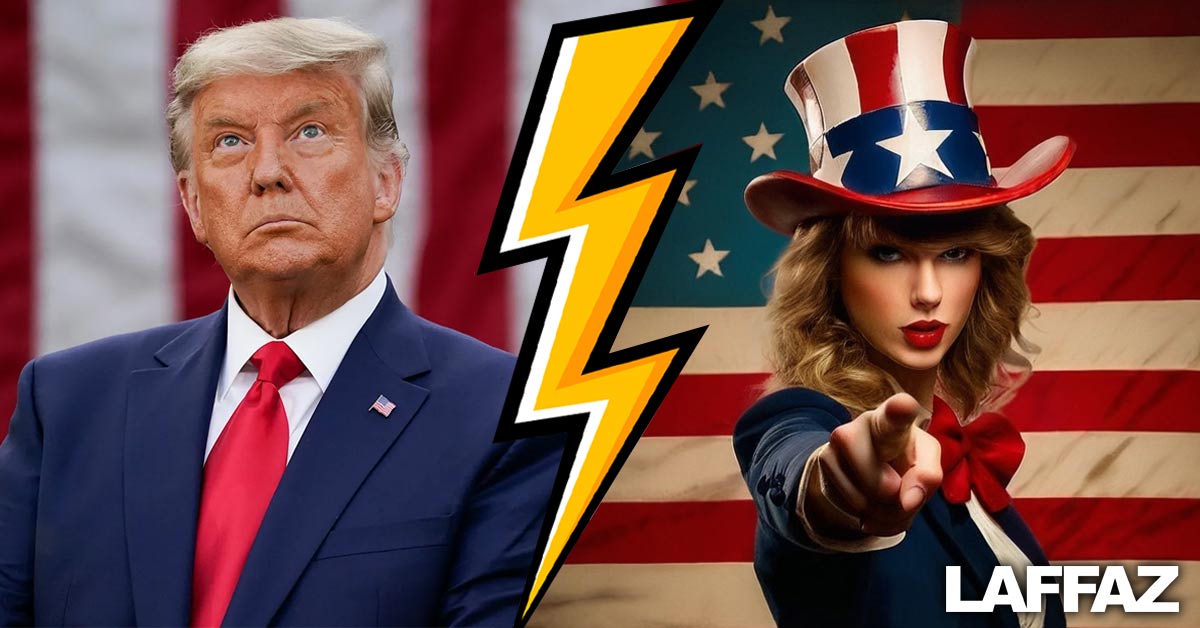Former President Donald Trump reportedly sparked controversy on Sunday by sharing AI-generated memes on Truth Social that falsely implied Taylor Swift and her fans were endorsing his presidential bid. As new laws regulating digital content come into effect, this incident highlights the potential risks of using manipulated images in political campaigns, particularly when they involve misrepresenting a public figure’s likeness without their consent.
In an interview with Fox News on Wednesday, Trump claimed that he had no knowledge of the origins of the images that were posted on Truth Social.
“I don’t know anything about them other than somebody else generated them. I didn’t generate them,” without naming the creator “These were all made up by other people.”
According to Noah Downs, an IP and entertainment lawyer, the growing trend of AI impersonators being used for endorsements is a pressing concern in his practice. “One of the things I’m seeing a lot of in my practice right now is the rise of AI impersonators across the board for endorsements,” he noted, speaking to TechCrunch on the condition that his comments not be construed as legal advice. This issue has become so pervasive that even the popular TV show “Shark Tank” felt compelled to issue a public service announcement, alerting fans to the numerous scams that falsely impersonate the show’s investors.
One of the images shared by Trump features a crowd of young women sporting identical ‘Swifties for Trump’ t-shirts, but these images appear to be AI-generated and not authentic. In reality, they originated from a satirical post on X, highlighting the misleading nature of the content. While Taylor Swift’s fan base does encompass a range of political views, these manipulated images distort the truth and perpetuate a false narrative.
Trump also shared a manipulated screenshot from X, showing Taylor Swift portrayed as Uncle Sam, with the fabricated declaration: “Taylor wants you to vote for Donald Trump.”
It is worth noting that Taylor Swift has not yet weighed in on the 2024 U.S. presidential election. However, in 2020, she openly supported the Biden-Harris campaign and criticized Trump. Recently, some fans speculated that Swift had subtly endorsed Harris through an Instagram post, but this was unfounded. As a frequent target of deepfakes, Swift has faced non-consensual, explicit AI-generated images circulating on X, prompting lawmakers to introduce bills aimed at combating deepfakes. The issue even caught the attention of White House Press Secretary Karine Jean-Pierre, who urged Congress to take action.
Just eight months later, the legal landscape has shifted significantly. In Tennessee, home to Taylor Swift’s corporate representation, Governor Bill Lee signed the groundbreaking ELVIS Act into law in March. This pioneering legislation provides explicit protections for artists, including Swift, against unauthorized AI-generated imitations of their work.
“This legislation was passed with bipartisan support, because everyone appears to recognize the problems that AI and misuse of AI tools can present to the public,” said Downs.
Although the ELVIS Act is a groundbreaking law, its novelty means there’s no established precedent for its application in protecting artists. The legislation’s language primarily addresses AI-generated audio that can replicate an artist’s voice, such as the recent case of a fake Drake song that went viral.
According to Downs, ‘I do think that this is going to be a long-term issue that the ELVIS Act is very prescient in taking care of, but we need to have more robust national legislation about it.’ The ELVIS Act might be relevant in this case only because of Taylor Swift’s ties to Tennessee, where she has business and real estate interests.
Avi D. Kelin, a political law expert and partner at PEM Law, is skeptical about the ELVIS Act’s applicability in this case. He notes that the law seems to focus more on audio impersonation than visual manipulation. Kelin suggests that this issue might raise concerns about federal election integrity in the future.
Kelin told TechCrunch, “The larger question is whether the Federal Election Commission, which has jurisdiction over political communications, will get involved.” He expressed doubts about the FEC’s likelihood of issuing new guidelines on AI-generated political communications during this election cycle, stating that it doesn’t seem probable.
Although the Federal Communications Commission (FCC) is proceeding with plans to introduce new AI transparency rules for TV and radio ads, these regulations won’t cover social media posts from politicians. Social media remains a crucial aspect of campaign communications. Notably, research from the Center for Countering Digital Hate (CCDH) reveals a concerning trend: AI-generated disinformation on X has increased by an average of 130% per month over the past year.
Taylor Swift’s endorsement is the holy grail for politicians due to her immense cultural impact. Her support can be a game-changer in a closely contested election, as evidenced by her massive fan base: a Morning Consult survey reveals that over 50% of U.S. adults are Swift fans, with 16% considering themselves die-hard enthusiasts. This level of influence is particularly striking when compared to the relatively low voter turnout in the 2020 election, where only about two-thirds of eligible Americans cast their ballots.
“The [ELVIS Act] is brand new, and the exact parameters will need to be developed by the courts. This would certainly be an interesting test case!” Kelin said.
In the interview with Fox News, Trump said that AI is dangerous – citing his own experiences with AI “always very dangerous in that way,” said Trump
“It’s happening with me too,” he said. “They’re having me speak – I speak perfectly, absolutely perfectly – on AI, and I’m endorsing other products and things.”






